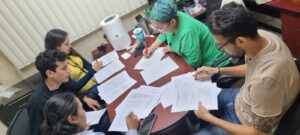
Sharon Gubamwoyo: Illuminating the Power of Wetlands in Combating Climate Change – The AuthorAID Connection
At the intersection of academic pursuit and environmental dedication lies the remarkable journey of Sharon Gubamwoyo, a passionate Ugandan researcher whose work is illuminating the significance of wetlands in the battle against climate change. Sharon’s research journey is a testament to the power of interdisciplinary exploration and the transformative impact of platforms like AuthorAID.
Early career researchers across the globe often navigate challenging terrain as they seek to unravel complex scientific questions and contribute to the betterment of society. This journey can be particularly daunting in regions like East Africa, where limited resources, institutional barriers, and lack of access to mentorship can hinder their progress. Sharon Gubamwoyo’s journey reflects the perseverance and potential of these researchers, and shines a light on the immense value they bring to solving challenges which are both local and global.
Sharon’s research canvas is vast, with limnology (the study of inland waters) as its focal point. Through her research she delves into the captivating realm of wetlands, greenhouse gas emissions, water and wastewater treatment, and has clear insight into the profound impacts of climate change on these delicate ecosystems. Sharon’s scientific voyage specifically aims to gain a deeper understanding of wetlands as sources and sinks of greenhouse gases. Her work to uncover more sustainable practices extends to water treatment, where she studies the integration of natural systems, especially wetlands, into water and wastewater treatment processes. These systems act as nature’s filtration mechanisms, purifying water and enhancing its quality.
With an affinity for wetlands and greenhouse gas emissions, Sharon’s exploration naturally extends to the intricate dance between these ecosystems and climate change. Her research probes how shifts in climate conditions impact wetland health, carbon sequestration capacity, and their role in global carbon dynamics. Beyond the scientific intricacies, Sharon’s work has profound implications for the environment. By scrutinising wetland degradation and restoration, she uncovers the effects of land-use changes and champions the significance of wetland preservation for biodiversity, water quality, and carbon storage.
“I am inspired to continue finding out more and more, and about the relations between these wetlands and the changing environment, people destroying these wetlands, coupled with climate change or climate uncertainty. And so, what’s the relation? Do we need these wetlands for climate change mitigation, or should we convert them to farmlands to better control food insecurity, so are they just a waste of time? I’ve looked up to some people who have done great things, and I’m like, “Yes, I think I can also do something, I can find out something that will actually help my community and my environment.” -Sharon Gubamwoyo
Sharon’s research embodies her passion and dedication to creating a better world. It’s a manifestation of her commitment to address pressing environmental concerns and carve a path towards solutions. Kenya, a country teeming with vital wetland ecosystems, finds an ally in Sharon’s work. Her insights contribute to wetland conservation strategies, resilience against climate change impacts, and the improvement of wetland and water management practices. Her investigations into wetlands’ role in climate change mitigation, biodiversity conservation, and sustainable development align with international goals like the United Nations Sustainable Development Goals (SDGs). Thanks to AuthorAID courses, guidance, networking and mentorship, Sharon has been able to develop her research skills and gain confidence in the academic arena.
The research journey Sharon has undertaken mirrors the resilience of wetlands—the ability to adapt, thrive, and inspire. Her quest to unravel the complexities of limnology and wetlands holds the promise of a brighter, more sustainable future. As Sharon’s work demonstrates, the power of research is not confined to academic corridors—it has the potential to shape policies, conserve ecosystems, and contribute to the global fight against climate change. In countries like Sharon’s native Uganda, and Kenya where she now works – as across much of the continent – early career researchers face unique challenges. Platforms like AuthorAID provide essential support, enabling researchers to tackle local problems that have a global significance – and with the support of a global community.


 Previous Post
Previous Post Next Post
Next Post


